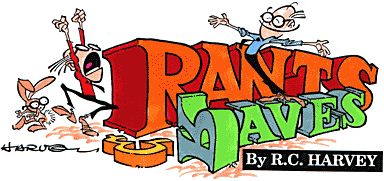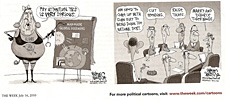 |
|
Rest in Splendor, Harvey Pekar At about 1 a.m. on Monday, July 12, Harvey Pekar’s wife of 27 years, writer Joyce Babner, summoned the police. When they arrived at the Cleveland Heights home, they found Pekar dead. He was 70, reported Ethan Sacks at the New York Daily News, and authorities assume that he died of natural causes: although no specific explanation was released in the first accounts, Pekar, whose autobiographical comics had raised the medium to art, suffered from prostate cancer, asthma, high blood pressure and depression. At his blog, Russell Hodin wrote: “Best known for his sporadic, dyspeptic and largely autobiographical comic series American Splendor, which started in 1976 and later inspired a feature film, Pekar forged a distinct authorial voice—and a popular persona—that fused caustic and frequently self-lacerating wit, Rust Belt stoicism, casual bohemianism and shrewd observations about quotidian [everyday] human existence.” Joanna Connors at Cleveland’s Plain Dealer said Pekar portrayed himself as “a rumpled, depressed, obsessive-compulsive ‘flunky file clerk’ engaged in a constant battle with loneliness and anxiety. American Splendor carried the subtitle, ‘From Off the Streets of Cleveland,’ and just like Superman, the other comic book hero born in Cleveland, Pekar wore something of a disguise. He never stepped into a phone booth to change, but underneath his persona of aggravated, disaffected file clerk, he was an erudite book and jazz critic, and a writer of short stories that many observers compared to Chekhov, despite their comic-book form. “Unlike the superheroes who ordinarily inhabit the pages of comic books,” Connors continued, “Pekar could not leap tall buildings in a single bound, nor move faster than a speeding bullet. Yet his comics suggested a different sort of heroism: The working-class, everyman heroics of simply making it through another day, with soul—if not dignity—intact.” “Many of Pekar's writings,” said Hodin, “benefitted immeasurably from the quality of the accompanying artwork, supplied by such collaborators as Frank Stack and R. Crumb, a longtime friend and early supporter of Pekar.” It was Crumb, whom Pekar met through their mutual infatuation with old-time phonograph records, who persuaded Pekar to attempt storytelling in comic book form. Inspired by Henry Miller, Pekar told stories about himself. Crumb was Pekar’s first collaborator: unable to draw his own stories, Pekar still drafted his tales in comics form, filling the panels with stick figures and their speech balloons—perfect stage directions for Crumb and the other comics artists who would render his work over the next thirty-odd years. The first Pekar-Crumb effort appeared in 1972 as a short autobiographical story in an underground anthology title. “Crumb,”
Hodin said, “once praised Pekar's gift for spinning art out of one man's middle
American reality ‘so staggeringly mundane it verges on the exotic.’" Said Anthony Bourdain at his blog on July 13: “Pekar was famed as a ‘curmudgeon,’ a ‘crank’ and a ‘misanthrope’ yet found beauty and heroism where few others even bothered to look. In a post-ironic and post-Seinfeldian universe he was the last romantic—his work sincere, heartfelt, alternately dead serious and wryly affectionate. The last man standing to wonder out loud, ‘What happened here?’ His continuing compulsion to wonder what's wrong with everybody else was both source of entertainment and the only position of conscience a man could take.” It wasn't until the 2003 movie, "American Splendor," starring Paul Giamatti as Pekar, that mainstream America learned of the writer, his flaws, his bizarre courtship of his beloved wife Joyce Brabner (they married after three dates), the adoption of their foster daughter, Danielle, and his heart-breaking struggle with cancer as rendered in graphic novel form in Our Cancer Year. In
a statement, actor Giamatti called Pekar "one of the most compassionate
and empathetic human beings I've ever met. He had a huge brain and an even
bigger soul. And he was hilarious. He was a great artist, a true American poet,
and there is no one to replace him." Said
Bourdain: “A few great artists come to ‘own’ their territory. As Joseph
Mitchell once owned New York and Zola owned Paris, Harvey Pekar owned not just
Cleveland but all those places in the American Heartland where people wake up
every day, go to work, do the best they can—and in spite of the vast and
overwhelming forces that conspire to disappoint them—go on, try as best as
possible to do right by the people around them, to attain that most difficult
of ideals: to be ‘good’ people.” And fellow tcj blogger Rob Clough concurred: “The movie may have raised his profile, but every young cartoonist knew who Pekar was. Every autobiographical artist who emerged during the last thirty years owes him a debt; without Harvey Pekar, we would not be seeing the likes of Fun Home, Stitches or any number of high-profile, literary autobiographical comics. “Pekar was a self-made man,” Clough went on, “an autodidact with an insatiable desire for literature, history and politics. While passionate and occasionally cranky about his passions and interests, he was always as rational as he was forceful in presenting his arguments. Pekar worked through depression, three bouts with cancer and several other maladies and turned them into story fodder in a way that was true to life without being maudlin. Despite his reputation as a curmudgeon, his genuine warmth and interest in the lives of others always shone through during his personal appearances as well as his comics. After all, the man was a storyteller and always had his ear to the ground for new stories to tell about the lives of others. Pekar was an American original, a working-man’s intellectual and poet, and a remarkable cultural force in spite of himself.” In recent years, Pekar’s autobiographical output slowed as he collaborated with other writers (Paul Buhle chiefly) on graphic histories— Students for A Democratic Society, The Beats, —and an adaptation of Studs Terkel’s Working. He even wrote a libretto for a “jazz opera,” Leave Me Alone, that he described as a “rant” against the divide between the Everyman and avant-garde art. At washingtoncitypaper.com, Mike Rhode, who edited the only lengthy book about Pekar, Harvey Pekar: Conversations, a collection of interviews published by the University Press of Mississippi (2008), said: “At 70 years old, Harvey finally lost his battle with life—but he had beaten obsessive-compulsive behavior, two types of cancer, depression, and a failed hip joint. He survived a low-wage and low-prestige job, made a successful marriage (albeit on his third try), provided a home to a young girl in need, published a 30-year long autobiography, revolutionized the idea of what comic books could be, and generally lived a splendid American life—demonstrating to all of us that ‘a quotidian life’ is worth both living and examining.” The Plain Dealer, Pekar’s hometown newspaper, gets the last word but one in this brief eulogy: “Pekar was the improbable artist, finding his metier in recording the banalities and traumas of life through graphic means, via the inspiration of his friend, celebrated cartoonist R. Crumb. He fed his talents with the help of a wide stable of collaborators and friends—a group that ranged as far as he did, from jazz to the streets of Cleveland to war in Macedonia. He was a restless, creative, haunted soul who spoke for R. Average, and has finally found peace. Rest in splendor, Harvey Pekar.” I didn’t know Pekar although I should have: we sat next to each other in the “underground” artists alley at the Chicago Con when it was still held at a Ramada Inn near the airport. The accommodation for cartoonists’ peddling their wares in the upstairs ballrooms filled early, and so the undergrounders—including S. Clay Wilson and Grass Green, as well as Pekar—were assigned space in the bowels of the hotel, a room of our own, so to speak. Green was on one side of me, and Pekar on the other. In those years of my novitiate, I didn’t know who either of my neighbors were. And I was, alas, too timid in these unfamiliar surroundings to engage either in much conversation. In later years, though, I secretly aspired to collaborate with Pekar so there’d be a comic book story by Harvey and Harvey. Just the sort of confusion I like to foster. And here’s a sketch of how my Harvey Pekar would look. The sources of the remarks and encomiums quoted above are:
http://blog.cleveland.com/metro/2010/07/cleveland_comic-book_legend_ha.html
http://anthony-bourdain-blog.travelchannel.com/read/the-original-goodbye-splendor?fbid=ckCB_Fs_01R
In addition, one of Pekar’s collaborators in recent years, Paul Buhle, is interviewed at: and at http://superitch.com/?p=10364, http://superitch.com/?=10363 http://chronicle.com/blogPost/Memories-of-working-With/25471/?sid=at&utm
NOUS R US Hugh Hefner still believes in Playboy, despite the magazine’s faltering fortunes. We’ve noted various evidences of the decline—chiefly the steadily decreasing number of pages in the magazine and a skimping on cartoons. But hard-nosed fiscal observers see even more evidence: advertising pages last year totaled 311, down from 765 in 2000; and circulation has dropped from 5.6 million in 1975 to merely 2.02 million, a drop of a million copies since 2000 alone. But Hef at 84 believes, apparently, that the brand is worth more than the magazine, and he offered to buy back the 30% of the Playboy empire that he presently does not own, with the object, it sez here, of making his empire his own again—that is, private ownership. Hef reportedly offered $5.50 per share, a 40% premium above a Friday closing on July 9 of $3.94, a healthy profit for share holders should they agree to sell. Penthouse magazine, hearing of Hefner’s offer, also made an offer. But there’s not much chance that offer will prevail. According to the Associated Press, Hef “made it clear that he is not interested in a sale or merger.” He wants his brainchild for himself. And that’s not hard to understand: he founded the magazine and made a fortune with it, and he is closely associated with it and its impact upon American mores. Why wouldn’t he want to perpetuate that association in the popular mind? And he figures since over half the company’s income these days comes from licensing the brand for consumer products, he can recoup his investment and, perhaps, even turn the fortunes of the magazine around. To buy back the 70% of the empire he doesn’t already own, Hefner will join a little known private equity firm, Rizvi Traverse Management LLC, for financial assistance.
***** Surprisingly—to me anyhow—The Week magazine used two cartoons by arch conservative editoonist Glenn McCoy in
the July 16 issue. Seldom (maybe never except once before) does a cartooner get
two of his oeuvre in a single issue of the magazine. One of McCoy’s is
predictable in its anti-Democrat venom (the attack on Gore as a “sex poodle”),
but the other
***** I stand corrected: Matt Wuerker, who, I said last time (Op. 264), was one of the increasingly not-so-rare breed of editoonist, full-time non-staff, actually does have a staff position, full-time, Mike Rhode reminds me. Matt is full-time on staff with Politico, an online newspaper (as I said), and Politico also has a paper edition and Matt appears there, too. So Matt’s not freelance anymore, although he was for many many years. Thanques, Mike.
To find out about Harv's books, click here. |
|

send e-mail to R.C. Harvey Art of the Comic Book - Art of the Funnies - Accidental Ambassador Gordo - reviews - order form - Harv's Hindsights - main page |

